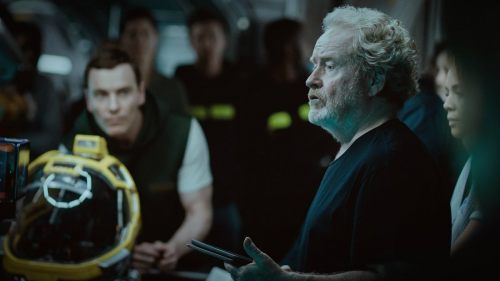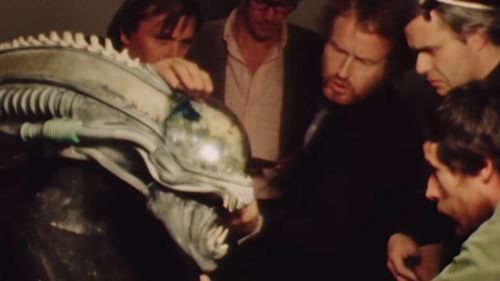The Anti-Human Marvel Of ALIEN: COVENANT
***Warning –Spoilers for Alien: Covenant Ahead***
Almost forty years ago, Ridley Scott directed Alien (’79). The clichéd way to end that opener would be something along the lines of “and then cinema was never the same”. But just because something’s hacky doesn’t mean it’s incorrect. Like George A. Romero’s Dawn of the Dead (’78) and John Carpenter’s Halloween (’78), Scott’s outer space stalker picture used its genre trappings to create existential terror, centered around the Lovecraftian unknowability of death itself. These works were natural extensions of the artistic discussions initiated by Wes Craven’s Last House on the Left (’72) and Tobe Hooper’s The Texas Chain Saw Massacre (’74) during the earlier half of the '70s (both building on Romero again, whose Night of the Living Dead (’68) remains the conversation starter this whole generation was in dialogue with). They were drive-in distillations of dread their creators’ war torn generation endured on a daily basis, but rarely expressed inside a theater. Scott merely shot these anxieties into an intergalactic realm, perfecting the Reaper’s specter in the form of HR Giger’s petrifyingly iconic xenomorph.
In the four decades since Scott mortified audiences across the globe with his chilling vision, the Alien franchise became a terrorist training camp, in which young auteurs could come cut their teeth. James Cameron gave us his Vietnam film via Aliens (’86), David Fincher killed the series’ tough girl heroine off with Alien 3 (’92), and Jean Pierre-Jeunet teamed with Joss Whedon to deliver a grotesque splatter play in Alien: Resurrection (’97). While these men were remolding the xenomorph, going as far as to introduce new variations on the creature with each installment, Scott helmed everything from further game-changing sci-fi (Blade Runner [‘82]), Academy Award-winning pulp fiction (Thelma & Louise [‘91], Gladiator [‘00]), military fetish films (GI Jane [‘97], Black Hawk Down [‘01]), historical epics of all colors (Kingdom of Heaven [‘05], American Gangster [‘07]), and even a Hannibal Lecter gore operetta (Hannibal [‘01]). He became the granddaddy of the “Director’s Cut”, bought and renovated the historic Shepperton Studios, and lost his equally talented brother to suicide (RIP Tony Scott); quite the journey for a man who started as a BBC art director before founding his own commercial boutique.
Yet it all came back to the xenomorph in ’12, when Scott decided he’d return to the Alien franchise (which had hit an all-time low with the vs. Predator duology in ’04 and ’06). Prometheus promised to be the beginning of a prequel trilogy – a somewhat dubious decision that went down easy with fans, due to the imaginative notion of cinema’s greatest world-builder giving this universe a second go. However, those lining up for another creature feature were sorely disappointed, as Scott delivered a movie that didn’t even feature the famed killer, and instead used the previously established blue collar cosmos as window dressing for heady interrogations regarding the nature of creation and mankind’s eternal question: where do we come from? Teaming with Lost scribe Damon Lindelof (who heavily rewrote Jon Spaihts’ original script) should’ve telegraphed the movie’s intentions from pre-production, and Prometheus was maligned by critics and fans before seeing a recent reappraisal by the likes of Matt Zoller Seitz (along with others). In this writer’s opinion, Scott’s second Alien chapter remains a deeply flawed, admirably ambitious aesthetic endeavor that doesn’t entirely work, but is damn fun to watch with the right amount of academic detachment.
Alien: Covenant – the ostensibly course-correcting sequel to Prometheus – assured a much more familiar approach to the franchise in its trailer, which went out of its way to close on a rampaging xeno attempting to headbutt its way through an escaping spacecraft’s windshield. The teaser poster was ominous; black and green with one of the slimy monsters emerging from the darkness, an unpretentious tagline floating above its oblong dome: Run. Hell, even the title included the promise of tossing the series back to the stalk and kill theatrics of the original Alien. Those who hated Prometheus breathed a sigh of relief, entering the theater with hopes of receiving an actual horror movie instead of a philosophical treatise on the beginnings of being. When they exited, Covenant became one of the most controversial pictures of ’17 – a love it or hate it proposition where Scott had performed another bait and switch, albeit to a slightly lesser extent.
Like Blade Runner, Covenant’s first shot is of an eye opening. The synthetic David (Michael Fassbender) awakens on his throne, a white room before him. His creator, Peter Weyland (Guy Pearce), asks what the robot sees. David describes the space, and then a brief philosophical exchange ensues. The synthetic’s father explains that he hopes to one day answer life’s great question with David’s assistance: who created man? But the first conversation of his existence leads the android boy to question not only the mortality of his inventor, but that of all things. Thus, we get to the heart of Alien: Covenant, which finally answers a query many fans probably didn’t need to know: how did the xenomorph come to be? By fastening the first two films in his prequel trilogy around David’s existential curiosity, Scott (with a hefty assist from screenwriters John Logan and Dante Harper) defines a creature which was ethereal in his ’79 classic. But the query goes beyond merely providing a backstory for one of cinema’s greatest monsters, presenting the audience with a central character created by man, but who ultimately wants to harness that same power in order to breed new life in the solar system. David is, in some ways, the classic mad scientist. However, he’s driven by the knowledge that he will not only outlive his birther, but most life in the galaxy. And what good is living if we cannot mold something to share it with?
The most common criticism of Covenant is that its human characters – the crew aboard the eponymous colonizing craft – are extremely stupid. Yet what this condemnation doesn’t seem to consider is that Scott’s second prequel picture is a decidedly anti-human affair. The series requisite distress signal (which has now been used so many times throughout the franchise its inclusion here cannot be seen as anything but narratively deconstructive) the good ship answers sets them down on a new planet that’s inhabited by earthly vegetation, but zero signs of anything beyond botanical life. That’s because David’s set up shop for the last ten years, performing experiments on any “meat” he can find, in order to manufacture a proto-xeno: the albino “neomorph” which invades its hosts via black spores (an airborne variation on the Engineers’ bio-weaponized black goo from Prometheus) before bursting through mouths and backs with thoughtless abandon. To call Covenant cruel is not just unquestionable, it seems to be Scott’s driving motivation. He’s punishing yet another set of flesh suits for following their hearts, pride and faith toward certain doom; causing these sets of couples to die agonizing deaths in front of friends and lovers as his camera observes the gory set pieces with clinical detachment.
In fact, Covenant’s human crew are simply narrative vessels for Scott to reach what he’s really interested in: a continuation of David’s story as restless scientist. Covenant stops dead in its tracks at the halfway mark for David to meet Walter (also Fassbender) – the synthetic who’s been tasked to the colonization mission. In Scott’s most outlandishly brilliant move, Covenant becomes a vocalized debate (over flute fingering, no less), as David questions Walter’s place in the world. The older android’s sentient nature scared his masters, so they removed certain elements of his programming – namely: the desire to create. But David states he and Walter were never put on this planet to serve. Humans are the inferior class; after all, they are mortal. David’s dreams are filled with lonely perfection that only Walter can comprehend, and he asks his brother to join him in his mountain laboratory experiments, misattributing Shelly’s “Ozymandias” in the picture’s most overt illustration of its complicated themes. It’s clear that Scott admires David most of all; the synthetic’s desire to advance to the next stage of evolution, leaving behind a silly species guided by divine forces that probably don’t exist. David met his God and then conquered Him, before moving into the outer regions of the galaxy and committing a literal holocaust against the Engineers on one of their own worlds. He is a being of mad conception, believing that destruction is essential to clear the path for what comes next. If you squint, you can even view Covenant as Scott thumbing his nose at the science v. religion debate, using pop art to posit a rather savage ethos.
The birth of the first xenomorph is handled with angelic idolization, following the movie’s most metatextual moment, wherein David bids final farewell to Elizabeth Shaw (Noomi Rapace) with a flute rendition of Prometheus’ theme. After luring the Covenant’s captain (Billy Crudup) to a cave where David has constructed the first face hugger eggs, the impregnating organism is unleashed and lays its embryos inside the man’s chest. Once the black skinned creature hatches, David stands over it like a proud father, watching his child take its first steps. Jed Kurzel’s score rises with twinkling pianos, as if Scott is paying tribute to the icon which helped launch his feature career into the upper stratosphere. It’s also no coincidence that the initial xeno host is a man who defines himself by his faith, as David again is proving that he is the One True God, capable of using antiquated beings as incubators for cutting-edge life. Scott’s admiration for both the synthetic and the monster takes the movie to unprecedented anti-human heights, as if affirming that his own filmic creations will live on, long after the now eighty-year-old master has shuffled off this mortal coil.
This being a Ridley Scott movie, Covenant is impeccably designed and executed. Though the titular spaceship is much more modern than the Nostromo (thus calling the movie’s status as a properly functioning prequel into question), the design again solidifies Scott as cinema’s greatest futurist. Kurzel’s orchestration is filled with droning callbacks to the original Alien (including cues from Jerry Goldsmith’s score), as DoP Darius Wolski pushes through displaced wheat fields and dives into dank caves, exploring the textured limits of digital photography. Nevertheless, for all the technical wonder on display, the most loving homage may come in the form of a sketchbook found on David’s workbench. In it, there are biomechanical drawings that will look familiar to any fan of Giger’s work, as Scott’s transposing of the artist’s singular style onto his synthetic protagonist is a touch that’s oddly sentimental in a film filled with wanton nastiness. As Covenant is the first Alien picture to be released in the wake of Giger’s ’14 death, it’s difficult not to see this as the director’s own eulogy to the xeno’s designer. Here is an artist meeting his creation face to face, after all these years.
Let's return to the opening shot – where David’s eyelid lifts for the first time. In Blade Runner, Scott presented us a future in which Replicants -- synthetic androids used to perform manual labor on Off World Colonies -- were hunted down by specialized policemen when they decided to pursue a lifespan beyond the limited one they’re bestowed. It's a rather cynical look at humanity, where those who've manufactured beings to perform the work they don't want to do kill said slaves off once they show interest in a purpose beyond menial tasks. Covenant brings us the POV of two similar entities, who respectively look upon their place amongst humans differently, despite being designed in almost identical fashion."I don't dream," Walter tells David when asked what reveries visit him at night. But Covenant truly is a dream in which humans are nothing more than perfunctory decorations, accenting a dual between warring artificial intelligences. Perhaps this is Scott's most pressing concern - a creator reaching the end of his own lifespan, and wondering if his contributions to the human landscape will endure, or if the reset button should be pushed, allowing other lifeforms to take control in the wake of human beings. It’s a full circle visitation of the inevitable nature of death that permeated the original Alien, and if this is to be Ridley Scott’s final installment, it is indeed a lonely marvel.
Alien: Covenant is available now on Blu-ray, DVD and to stream.



